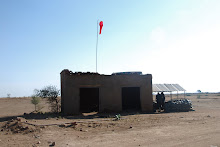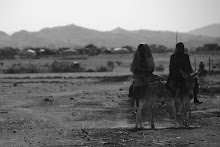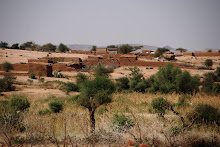The expulsion of aid groups from Darfur will have important consequences not only for beneficiaries, but for the very future of humanitarian action worldwide.
Public debate on the expulsions of 13 NGOs has so far focused on the immediate humanitarian consequences – a possible meningitis outbreak, water supply and food distribution gaps, mass population movements, etc - and calls for the Government of Sudan to reverse its decision.
But the fact that the international community is calling for a reversal of the expulsions rather than pursuing legal recourse, reveals a deeper issue at the heart of the controversy - namely, the ambiguous legal status of today’s humanitarian organizations and their work.
Humanitarian assistance is enshrined in international law, but so limited as to be unrecognizable to those familiar with the operations of today’s multi-billion dollar a year industry.
For one, the Geneva conventions guarantee the right of the populations to receive life-saving assistance, but not the right of givers to give such aid. So, theoretically, a government could refuse humanitarian assistance from some actors if the populations’ needs were met by another group.
But the world seems to have moved beyond a limited interpretation of humanitarian assistance as meeting the immediate needs of suffering populations to view humanitarian organizations as moral arbitrators, public-opinion makers, and the embodiment of an international consciousness - both speaking out and acting against wrongs.
As a result, many of today’s organizations are walking on a tight-rope between neutrality and advocacy, between serving the immediate needs of populations, and trying to influence the root causes of suffering by speaking out against violations.
For aid agencies that remain on the ground in Darfur who must now decide whether to remain, expand, or retreat, the expulsions have spurred soul-searching as to exactly which role they should play. This is a critical opportunity for the international community to reflect on the changing role of humanitarian organizations in the technology-saturated global village of the 21st century - answering such questions as:
Can confidentiality exist in a world of digital photos? (During the Abu Graib scandal, once the photos of torture were release, ICRC was severely criticized for not speaking out about the abuses earlier)
Can we speak locally in a world of global polarization? (moderate statements designed to influence local political actors to improve the humanitarian situation can be taken out of context and manipulated by extremists on both sides to influence the political process)
Can apolitical agencies effectively separately themselves from hybrid political-military-humanitarian interventions such as exist in Afghanistan, Iraq, Darfur and Congo? (if NGOs are seen as being ‘too Western,’ perhaps because their headquarters are in Europe, they may be perceived as part of a military intervention and hence a legitimate target for reprisals or attack)
Tension has been building on the subject ever since the 1970s when ex-ICRC staff, disgruntled with the strict speech embargo placed on the organization’s employees during the Biafra war, founded MSF and chartered a new course for humanitarianism that both meets needs and raises awareness of disasters.
And for the past two decades, in the age of celebrity activism, you-tube, and terrorism, humanitarians have struggled to play a role of ‘pragmatic neutrality’ -operating with sufficient discretion to “maintain the appearance on non-involvement in the politics of conflict (HPG Report),” but conducting sufficient public advocacy to maintain a seat at the policy table, secure funding, or influence the root causes of war.
This leads us to the slightly ironic situation in which aid groups have been accused of taking a stand on politics and security and have been evicted from the country (perhaps having chosen to emphasize the political over the humanitarian), and the UN Security Council, entrusted with maintaining international peace and security, has issued a statement stressing the reverse, namely, the importance of the humanitarian over the political. Yesterday, the Security Council, unable to reach consensus earlier this month on a statement vis a vis the ICC, instead stressed the importance of "continuing the distribution of humanitarian assistance to all the needy in Darfur."
This is a golden opportunity to transform the chaos of Darfur into more clarity for international humanitarian law.
Saturday, March 28, 2009
Wednesday, March 25, 2009
Hunger Strike
Residents, or at least a few powerful leaders, of Kalma camp in South Darfur and two other camps in North Darfur have rejected offers of humanitarian assistance.
In both written and spoken statements, camp spokesmen claim they cannot accept national or international NGOs that were not expelled from the country to fill the gaps in medical, sanitation, schooling or other services left by the recent expulsions of nearly half of the aid organizations operating in Darfur.
At best, this refusal represents the consensus of a group of violence-affected and wary residents mistrustful of the intentions of the government - believing that any agency left operating in Darfur is either too biased or too weak to be of any good.
At worst, the refusal is the result of manipulative rebel leaders wagering the suffering of their supporters against the possibility of portraying a negative media image of the Sudanese regime.
In theory, it doesn’t matter. Humanitarianism, by its very nature, is supposed to be above the fray. As long as civilians are suffering during wartime due to factors beyond their control, humanitarian workers should provide assistance.
Yet, it seems to matter. Engaging with IDP leaders who have refused aid (through dialogue, persuasion, or negotiation) in order to continue providing services sets a disturbing precedent. The refusal will continue until leaders feel they are loosing more than they are gaining from the current tactic – which may be after a significant number of deaths. And anything we, as a humanitarian community, give to these leaders is chalked up in the gains column (be it legitimacy, political advocacy, or physical assistance).
At the very least, the leaders should be held publicly accountable for the crimes.
In Darfur in the past year, there have been many examples of such 'humanitarian bargaining'. In one camp, fearing a retaliatory attack by militia groups after killing some members of the groups, residents of one West Darfur IDP camp took hostages and demanded the arrival of UN ‘protection’ troops before their release.
In another case, camp leaders in North Darfur refused access to UNAMID police and military patrols for months until compensation was paid to the owner of a motorcycle damaged by a UNAMID vehicle during an earlier patrol.
One of the most valuable commodities that IDPs have ownership of is their own image as victims/recipients. For Darfuris, that image has become quite prominent and hence a powerful negotiating tool – perhaps, an unintended consequences of the huge American advocacy campaign for action in Darfur.
The question now, is how far are we willing to compromise humanitarian principles of neutrality and impartiality to give aid? Can we let a group of people dictate the terms of aid just to ease our conscience over letting people die in faraway places?
How is this refusal substantively different than the Sudanese government’s harassment of NGOs - except without the excuse of sovereignty?
Should the leaders who have orchestrated the refusal be condemned publicly by UNAMID for the crime of denying humanitarian access to suffering civilians?
In both written and spoken statements, camp spokesmen claim they cannot accept national or international NGOs that were not expelled from the country to fill the gaps in medical, sanitation, schooling or other services left by the recent expulsions of nearly half of the aid organizations operating in Darfur.
At best, this refusal represents the consensus of a group of violence-affected and wary residents mistrustful of the intentions of the government - believing that any agency left operating in Darfur is either too biased or too weak to be of any good.
At worst, the refusal is the result of manipulative rebel leaders wagering the suffering of their supporters against the possibility of portraying a negative media image of the Sudanese regime.
In theory, it doesn’t matter. Humanitarianism, by its very nature, is supposed to be above the fray. As long as civilians are suffering during wartime due to factors beyond their control, humanitarian workers should provide assistance.
Yet, it seems to matter. Engaging with IDP leaders who have refused aid (through dialogue, persuasion, or negotiation) in order to continue providing services sets a disturbing precedent. The refusal will continue until leaders feel they are loosing more than they are gaining from the current tactic – which may be after a significant number of deaths. And anything we, as a humanitarian community, give to these leaders is chalked up in the gains column (be it legitimacy, political advocacy, or physical assistance).
At the very least, the leaders should be held publicly accountable for the crimes.
In Darfur in the past year, there have been many examples of such 'humanitarian bargaining'. In one camp, fearing a retaliatory attack by militia groups after killing some members of the groups, residents of one West Darfur IDP camp took hostages and demanded the arrival of UN ‘protection’ troops before their release.
In another case, camp leaders in North Darfur refused access to UNAMID police and military patrols for months until compensation was paid to the owner of a motorcycle damaged by a UNAMID vehicle during an earlier patrol.
One of the most valuable commodities that IDPs have ownership of is their own image as victims/recipients. For Darfuris, that image has become quite prominent and hence a powerful negotiating tool – perhaps, an unintended consequences of the huge American advocacy campaign for action in Darfur.
The question now, is how far are we willing to compromise humanitarian principles of neutrality and impartiality to give aid? Can we let a group of people dictate the terms of aid just to ease our conscience over letting people die in faraway places?
How is this refusal substantively different than the Sudanese government’s harassment of NGOs - except without the excuse of sovereignty?
Should the leaders who have orchestrated the refusal be condemned publicly by UNAMID for the crime of denying humanitarian access to suffering civilians?
Subscribe to:
Comments (Atom)












































